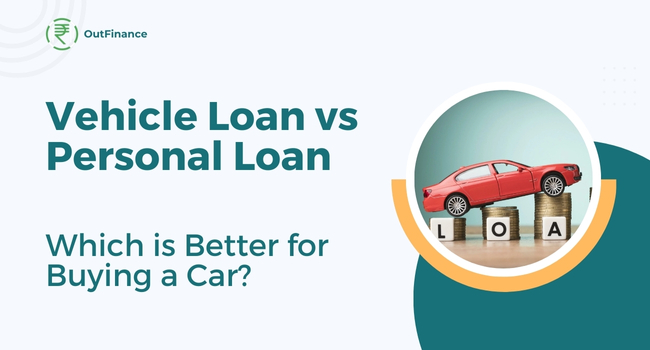Vehicle Loan vs. Personal Loan: Which is Better for Buying a Car?

Buying a car is an exciting milestone for a middle class family or couple, but it often requires a significant financial investment. For many, financing options are necessary to make this dream a reality.
Two common choices for car financing are vehicle loans and personal loans. While both options can help you purchase a car, choosing the right one can make a big difference in terms of costs, flexibility, and overall convenience.
This article will compare vehicle loans and personal loans in detail to help you make an informed decision. But before that, you can read here about all the loan and other elements.
Vehicle Loan: Features, Pros, and Cons
Features of Vehicle Loan:
-
- Secured Loan: Vehicle loans are secured against the car being purchased. This means that if you fail to repay the loan, the lender has the right to repossess the car.
- Loan Tenure: Vehicle loans typically have longer tenures, ranging from 3 to 7 years, which allows for lower monthly payments.
- Interest Rates: Interest rates for vehicle loans are usually lower compared to personal loans because the car acts as collateral. You can also choose between fixed and floating interest rates.
Pros of Vehicle Loan:
-
- Lower Interest Rates: Since the loan is secured by the car, lenders are able to offer lower interest rates.
- Flexible Repayment Options: Vehicle loans offer different repayment options, allowing you to choose a tenure that fits your budget.
- Customizable Loan Terms: You can opt for fixed or floating interest rates and select different tenure periods according to your financial situation.
Cons of Vehicle Loan:
-
- Collateral Requirement: The car serves as collateral, meaning it can be repossessed if you default on the loan.
- Limited Usage: The loan amount can only be used for purchasing the car and cannot be diverted for other expenses.
Personal Loan: Features, Pros, and Cons
Features of Personal Loan:
-
-
- Unsecured Loan: Personal loans do not require collateral, which makes them an attractive option for those who don’t want to put up an asset.
- Loan Tenure: Personal loans generally have shorter tenures, ranging from 1 to 5 years, which may result in higher monthly payments.
- Interest Rates: Interest rates for personal loans are higher due to the absence of collateral.
-
Pros of Personal Loan:
-
-
- No Collateral Needed: You don’t need to use your car or any other asset as collateral, reducing the risk for the borrower.
- Flexible Usage: You can use the loan amount for multiple purposes, such as buying car accessories, insurance, or even paying off other debts.
- Quick Approval: Personal loans often have a quicker approval process compared to vehicle loans.
-
Cons of Personal Loan:
-
- Higher Interest Rates: Due to the unsecured nature of the loan, personal loans tend to have higher interest rates.
- Shorter Loan Tenure: Shorter tenures mean higher monthly payments, which may strain your budget.
- Eligibility Criteria: Personal loans may have stricter eligibility requirements due to the lack of collateral.
Comparing Interest Rates
-
- Interest Rates for Vehicle Loans: Vehicle loan interest rates in India generally range between 7% to 10%, depending on the lender and the borrower’s credit score.
- Interest Rates for Personal Loans: Personal loan interest rates can range between 10% to 15%, depending on factors like credit score, income, and relationship with the bank.
- Cost Comparison: For example, if you borrow INR 5 lakhs at 8% interest for a vehicle loan and 12% for a personal loan, the total interest paid over a 5-year period would be significantly lower for the vehicle loan.
- Fixed vs. Floating Rates: Fixed interest rates remain the same throughout the loan tenure, providing stability in EMI payments. Floating rates can change based on market conditions, which may result in fluctuating EMIs. Vehicle loans often offer both options, while personal loans typically have fixed rates.
Loan Tenure and EMI Comparison
-
- Loan Tenure: Vehicle loans typically offer longer tenures (up to 7 years), while personal loans have shorter tenures (up to 5 years).
- EMI Calculation: The EMI depends on the loan amount, interest rate, and loan tenure. For a vehicle loan of INR 5 lakhs at 8% interest for 5 years, the EMI would be around INR 10,138. For a personal loan of the same amount at 12% interest for 5 years, the EMI would be around INR 11,122.
- Example: Comparing the EMI for both types of loans, it’s clear that the vehicle loan has a lower EMI, making it more affordable for most borrowers.
- Impact on Monthly Budget: Higher EMIs from a personal loan can strain your monthly budget, whereas a vehicle loan’s lower EMI can provide more breathing room for other expenses.
Eligibility Criteria and Documentation
-
- Eligibility for Vehicle Loans: To qualify for a vehicle loan, you typically need a good credit score (above 700), a stable income, and proof of employment. Lenders also consider the value of the car being purchased.
- Eligibility for Personal Loans: Personal loans require a strong credit history and stable income, and the eligibility criteria can be stricter since there is no collateral. A credit score above 750 is often needed for favorable terms.
- Documentation Requirements:
- Vehicle Loan: You need to provide proof of income, identity, address, and details of the car being purchased.
- Personal Loan: You need to provide proof of income, identity, and address. The documentation is simpler compared to vehicle loans since there is no need for car-related documents.
Risks Involved
-
- Vehicle Loan Risks:
- Risk of Repossession: Since the car is collateral, failing to repay the loan can lead to repossession by the lender.
- Impact on Credit Score: Defaulting on a vehicle loan will negatively affect your credit score, making it harder to get loans in the future.
- Personal Loan Risks:
- Higher Financial Burden: The higher interest rates mean that the total repayment amount is significantly higher, which can become a financial burden.
- Impact on Credit Score: Missing payments on a personal loan can severely impact your credit score, affecting your ability to borrow in the future.
- Vehicle Loan Risks:
When to Choose a Vehicle Loan
-
- Lower Interest Rates: If you qualify for a lower interest rate and are comfortable using the car as collateral, a vehicle loan is a good choice.
- Specific Purpose: If you need a loan specifically for purchasing a car and want longer tenures and affordable EMIs, a vehicle loan is ideal.
- Tax Benefits: In some cases, vehicle loans may offer tax benefits, especially if the car is used for business purposes. This can make vehicle loans more attractive.
When to Choose a Personal Loan
-
- No Collateral Available: If you don’t want to use the car as collateral or don’t have other assets, a personal loan is a better option.
- Flexible Usage Needs: If you need extra funds for other expenses related to the car purchase, such as insurance, accessories, or even other personal needs, a personal loan offers more flexibility.
- Quick Approval: If you need funds quickly and meet the eligibility requirements, a personal loan may be the faster option, as it usually has a simpler approval process.
Real-Life Scenarios
Scenario 1: Ramesh wants to buy a new car and has a stable job with a good credit score. He prefers lower EMIs and is comfortable with the car being used as collateral. In this case, a vehicle loan is the better option due to its lower interest rates and longer tenure.
Scenario 2: Suresh wants to buy a car but also needs some extra cash for insurance and accessories. He doesn’t want to use the car as collateral and prefers a quick approval process. A personal loan would be more suitable for Suresh because of its flexibility and faster approval.
Scenario Comparison: In Ramesh’s situation, a vehicle loan is better due to lower interest rates and lower EMIs. In Suresh’s case, a personal loan is preferable because of the need for flexibility and quick processing.
Conclusion
-
- Summarize Key Points: Vehicle loans and personal loans both have their pros and cons. Vehicle loans offer lower interest rates and longer tenures but require collateral. Personal loans provide flexibility and quicker approval but come with higher interest rates.
- Recommendation: The best loan option depends on your individual circumstances, such as your credit score, comfort with collateral, and financial needs. Carefully evaluate your situation to determine which loan works best for you.
- Call to Action: Before making a decision, consider consulting with a financial advisor to ensure you’re making the right choice for your financial health.
FAQ Section
Question: Which loan has lower interest rates—vehicle loan or personal loan?
Answer: Generally, vehicle loans have lower interest rates because they are secured by the car.
Question: Can I use a personal loan to buy a used car?
Answer: Yes, a personal loan can be used to buy both new and used cars, as there are no restrictions on usage.
Question: What happens if I default on a vehicle loan?
Answer: The lender may repossess your car if you default on a vehicle loan, as it is used as collateral.

0 Comments